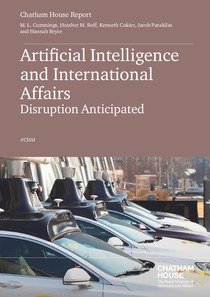Artificial intelligence and international affairs disruption anticipated
"This report examines some of the challenges for policymakers that may arise from the advancement and increasing application of AI. It draws together strands of thinking about the impact that AI may have on selected areas of international affairs – from military, human security and economic per...
| Main Authors: | , , , , |
|---|---|
| Institution: | ETUI-European Trade Union Institute |
| Format: | TEXT |
| Language: | English |
| Published: |
London
2018
Chatham House |
| Subjects: | |
| Online Access: | https://www.labourline.org/KENTIKA-19301718124911299909-artificial-intelligence-and-in.htm |
| Summary: | "This report examines some of the challenges for policymakers that may arise from the advancement and increasing application of AI. It draws together strands of thinking about the impact that AI may have on selected areas of international affairs – from military, human security and economic perspectives – over the next 10–15 years.
The report sets out a broad framework to define and distinguish between the types of roles that artificial intelligence might play in policymaking and international affairs: these roles are identified as analytical, predictive and operational.
In analytical roles, AI systems might allow fewer humans to make higher-level decisions, or to automate repetitive tasks such as monitoring sensors set up to ensure treaty compliance. In these roles, AI may well change – and in some ways it has already changed – the structures through which human decision-makers understand the world. But the ultimate impact of those changes is likely to be attenuated rather than transformative.
Predictive uses of AI could have more acute impacts, though likely on a longer timeframe. Such employments may change how policymakers and states understand the potential outcomes of specific courses of action. This could, if such systems become sufficiently accurate and trusted, create a power gap between those actors equipped with such systems and those without – with notably unpredictable results.
Operational uses of AI are unlikely to fully materialize in the near term. The regulatory, ethical and technological hurdles to fully autonomous vehicles, weapons and other physical-world systems such as robotic personal assistants are very high – although rapid progress towards overcoming these barriers is being made. In the longer term, however, such systems could radically transform not only the way decisions are made but the manner in which they are carried out." |
|---|---|
| Physical Description: | 50 p. Digital |

